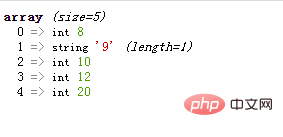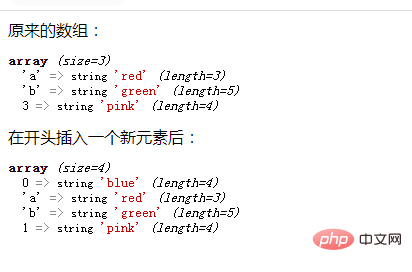 Backend Development
Backend Development
 PHP Tutorial
PHP Tutorial
 Tips for learning PHP arrays and using functions to insert elements (1)
Tips for learning PHP arrays and using functions to insert elements (1)
Tips for learning PHP arrays and using functions to insert elements (1)
In the previous article, we introduced two alternative methods of creating arrays - filling method to create new arrays. If you are interested, you can click on the link to read → "PHP Array Learning: How to Create a Filling Method Array》. Let me introduce to you how to insert new elements into PHP arrays. Let’s take a look.
There are multiple functions built into PHP that can add new elements to the array, such as array_unshift(), array_push(), array_pad(), array_splice(), etc. This article will first introduce you to two of the functions, array_unshift() and array_push(), and I will introduce you to the next two functions in the next article.
The following is a code example to introduce in detail how the array_unshift() and array_push() functions insert new elements.
1. The array_unshift() function inserts new elements into the array
array_unshift($array,$value1,$value2...) The function can insert one or more new elements (key values) at the beginning of the array.
Let’s take a closer look at the following example:
<?php $arr=array(10,12,20); array_unshift($arr,8,"9"); var_dump($arr); ?>
array_unshift($arr,8,9)It can be seen that two characters are inserted at the beginning of the $arr array new elements: the value "8" and the string "9", so the output result is:

array_unshift() The function will not maintain the original numerical index relationship, but will delete all numerical key names and reassign them, that is, count again from 0; but all string key names will remain unchanged.
<?php
header("Content-type:text/html;charset=utf-8");
$arr=array("a"=>"red","b"=>"green",3=>"pink");
echo "原来的数组:";
var_dump($arr);
array_unshift($arr,"blue");
echo "在开头插入一个新元素后:";
var_dump($arr);
?>Output result:

2. The array_push() function inserts new elements into the array
array_push($array,$value1,$value2...)The function can insert one or more elements (key values) at the end of the array.
Let’s take a closer look at the following example:
<?php $arr=array(10,12,20); array_push($arr,8,"9",3.14); var_dump($arr); ?>
array_push($arr,8,"9",3.14)It can be seen that in the $arr array Insert 3 elements at the end: integer "8", string "9" and floating point number "3.14", so the output result is:
The array_push() function is different from the array_unshift() function. It does not reset the numerical key name, but counts based on the original numerical key name.
<?php
header("Content-type:text/html;charset=utf-8");
$arr=array("a"=>"red","b"=>"green",3=>"pink");
array_push($arr,8,"9",3.14);
var_dump($arr);
?>Output result:
Okay, that’s all. If you want to know anything else, you can click this. → →php video tutorial
Finally, I would like to recommend a free video tutorial on PHP arrays: PHP function array array function video explanation, come and learn!
The above is the detailed content of Tips for learning PHP arrays and using functions to insert elements (1). For more information, please follow other related articles on the PHP Chinese website!

Hot AI Tools

Undresser.AI Undress
AI-powered app for creating realistic nude photos

AI Clothes Remover
Online AI tool for removing clothes from photos.

Undress AI Tool
Undress images for free

Clothoff.io
AI clothes remover

Video Face Swap
Swap faces in any video effortlessly with our completely free AI face swap tool!

Hot Article

Hot Tools

Notepad++7.3.1
Easy-to-use and free code editor

SublimeText3 Chinese version
Chinese version, very easy to use

Zend Studio 13.0.1
Powerful PHP integrated development environment

Dreamweaver CS6
Visual web development tools

SublimeText3 Mac version
God-level code editing software (SublimeText3)

Hot Topics
 1664
1664
 14
14
 1423
1423
 52
52
 1317
1317
 25
25
 1268
1268
 29
29
 1248
1248
 24
24
 Explain JSON Web Tokens (JWT) and their use case in PHP APIs.
Apr 05, 2025 am 12:04 AM
Explain JSON Web Tokens (JWT) and their use case in PHP APIs.
Apr 05, 2025 am 12:04 AM
JWT is an open standard based on JSON, used to securely transmit information between parties, mainly for identity authentication and information exchange. 1. JWT consists of three parts: Header, Payload and Signature. 2. The working principle of JWT includes three steps: generating JWT, verifying JWT and parsing Payload. 3. When using JWT for authentication in PHP, JWT can be generated and verified, and user role and permission information can be included in advanced usage. 4. Common errors include signature verification failure, token expiration, and payload oversized. Debugging skills include using debugging tools and logging. 5. Performance optimization and best practices include using appropriate signature algorithms, setting validity periods reasonably,
 PHP and Python: Comparing Two Popular Programming Languages
Apr 14, 2025 am 12:13 AM
PHP and Python: Comparing Two Popular Programming Languages
Apr 14, 2025 am 12:13 AM
PHP and Python each have their own advantages, and choose according to project requirements. 1.PHP is suitable for web development, especially for rapid development and maintenance of websites. 2. Python is suitable for data science, machine learning and artificial intelligence, with concise syntax and suitable for beginners.
 PHP in Action: Real-World Examples and Applications
Apr 14, 2025 am 12:19 AM
PHP in Action: Real-World Examples and Applications
Apr 14, 2025 am 12:19 AM
PHP is widely used in e-commerce, content management systems and API development. 1) E-commerce: used for shopping cart function and payment processing. 2) Content management system: used for dynamic content generation and user management. 3) API development: used for RESTful API development and API security. Through performance optimization and best practices, the efficiency and maintainability of PHP applications are improved.
 PHP: A Key Language for Web Development
Apr 13, 2025 am 12:08 AM
PHP: A Key Language for Web Development
Apr 13, 2025 am 12:08 AM
PHP is a scripting language widely used on the server side, especially suitable for web development. 1.PHP can embed HTML, process HTTP requests and responses, and supports a variety of databases. 2.PHP is used to generate dynamic web content, process form data, access databases, etc., with strong community support and open source resources. 3. PHP is an interpreted language, and the execution process includes lexical analysis, grammatical analysis, compilation and execution. 4.PHP can be combined with MySQL for advanced applications such as user registration systems. 5. When debugging PHP, you can use functions such as error_reporting() and var_dump(). 6. Optimize PHP code to use caching mechanisms, optimize database queries and use built-in functions. 7
 The Enduring Relevance of PHP: Is It Still Alive?
Apr 14, 2025 am 12:12 AM
The Enduring Relevance of PHP: Is It Still Alive?
Apr 14, 2025 am 12:12 AM
PHP is still dynamic and still occupies an important position in the field of modern programming. 1) PHP's simplicity and powerful community support make it widely used in web development; 2) Its flexibility and stability make it outstanding in handling web forms, database operations and file processing; 3) PHP is constantly evolving and optimizing, suitable for beginners and experienced developers.
 Explain the match expression (PHP 8 ) and how it differs from switch.
Apr 06, 2025 am 12:03 AM
Explain the match expression (PHP 8 ) and how it differs from switch.
Apr 06, 2025 am 12:03 AM
In PHP8, match expressions are a new control structure that returns different results based on the value of the expression. 1) It is similar to a switch statement, but returns a value instead of an execution statement block. 2) The match expression is strictly compared (===), which improves security. 3) It avoids possible break omissions in switch statements and enhances the simplicity and readability of the code.
 PHP vs. Python: Understanding the Differences
Apr 11, 2025 am 12:15 AM
PHP vs. Python: Understanding the Differences
Apr 11, 2025 am 12:15 AM
PHP and Python each have their own advantages, and the choice should be based on project requirements. 1.PHP is suitable for web development, with simple syntax and high execution efficiency. 2. Python is suitable for data science and machine learning, with concise syntax and rich libraries.
 PHP and Python: Code Examples and Comparison
Apr 15, 2025 am 12:07 AM
PHP and Python: Code Examples and Comparison
Apr 15, 2025 am 12:07 AM
PHP and Python have their own advantages and disadvantages, and the choice depends on project needs and personal preferences. 1.PHP is suitable for rapid development and maintenance of large-scale web applications. 2. Python dominates the field of data science and machine learning.



)
)
